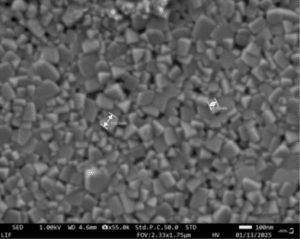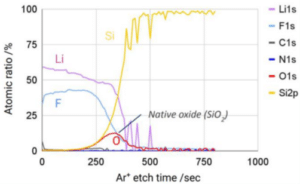In this work, we address the major limitations of existing LiF thin film deposition processes for Li-ion battery electrodes, including high deposition temperatures, film contamination, and the reliance on hazardous or greenhouse gas-based co-reactants. Using a a newly developed lithium precursor, LIFA (Air Liquide Advanced Materials), we present a plasma-enhanced spatial ALD process capable of depositing highly pure, conformal LiF films at low temperatures (100–200°C). This method eliminates the need for PFAS-derived or otherwise hazardous co-reactants, enabling safer, more sustainable processing compatible with sensitive materials like lithium metal anodes.
Overall, this work demonstrates the successful deposition of polycrystalline, C- and O-free LiF films with excellent conformality and ambient stability, leading to significant improvements in the electrochemical performance of various anode and cathode materials. The process is scalable via atmospheric-pressure roll-to-roll ALD, offering a viable path toward the industrial production of high-performance, next-generation lithium-ion batteries.
Authors
Joost van Himste, Niels Hoogendoorn, Paul Poodt – SparkNano Jamie Greer, Nicolas Blasco – Air Liquide Advanced Materials
Low temperature spatial Atomic Layer Deposition of LiF films for Li-ion batteries
Abstract
Lithium fluoride (LiF) thin films have gained significant attention as protective/passivating layers for Li-ion battery electrodes due to their wide electrochemical stability window and excellent chemical stability. When deposited using highly conformal methods like atomic layer deposition, LiF can effectively coat the complex, porous structures of battery electrodes to improve their electrochemical performance and stability. Several combinations of Li precursors and co-reactants for LiF deposition have been explored in the literature. However, these processes often require high deposition temperatures and yield films with notable contamination from oxygen (O), carbon (C), or silicon (Si). Furthermore, the low volatility and reactivity of many Li precursors, combined with the use of greenhouse gas- and PFAS-based or otherwise hazardous co-reactants (e.g., SF₆, CF₄, or HF), pose challenges to the applicability, sustainability, and scalability of reported ALD processes.
To address these limitations, we present a newly developed plasma-enhanced spatial ALD process employing a novel Li precursor named LIFA (Air Liquide Advanced Materials). This approach eliminates the need for greenhouse gas-, or otherwise hazardous co-reactants. Pure LiF films have been successfully deposited at temperatures ranging from 100°C to 200°C, making the process compatible with deposition on Lithium metal anodes. The films exhibit a growth per cycle of 0.04–0.05 nm/cycle and a refractive index of 1.36–1.39 at 633 nm. Characterization via XPS, XRD, and SEM confirms that the films are polycrystalline, highly pure, free of C and O contamination, and stable in ambient conditions.
These LiF films demonstrate excellent conformality on porous substrates and have been applied to various anode and cathode materials, including graphite, silicon, and LMNO, where they have shown significant improvements in electrochemical performance. Additionally, we outline our approach to scaling up the process for industrial-scale manufacturing using high-speed, atmospheric-pressure roll-to-roll spatial ALD. The combination of this sustainable and efficient LiF deposition process with high-speed spatial ALD presents a promising avenue for the mass production of high-performance Li-ion batteries.
Supporting information:

Figure of SEM image of a 62 nm LiF film

Figure of XPS spectrum of LiF on a silicon substrate
About SparkNano spatial ALD equipment
SparkNano develops and supplies spatial Atomic Layer Deposition equipment to scale manufacturing for next gen applications in batteries, solar, green hydrogen, opto-electronics and more. The company’s products enable its customers to seamlessly scale from lab-to-fab. Next to the high-quality equipment, an experienced team also supports in process development and optimization, provides application support and yield and performance management. SparkNano is located in the Brainport ecosystem in Eindhoven, the Netherlands and originally founded in 2018 as a spin-off of TNO (the Netherlands Organization of Applied Scientific Research).

Chief Technology Officer
Learn more about spatial ALD
Are you interested to learn how plasma-enhanced spatial ALD can help your innovation? Schedule a meeting with our team to learn more about our unique spatial ALD technology and state-of-the-art product portfolio.
